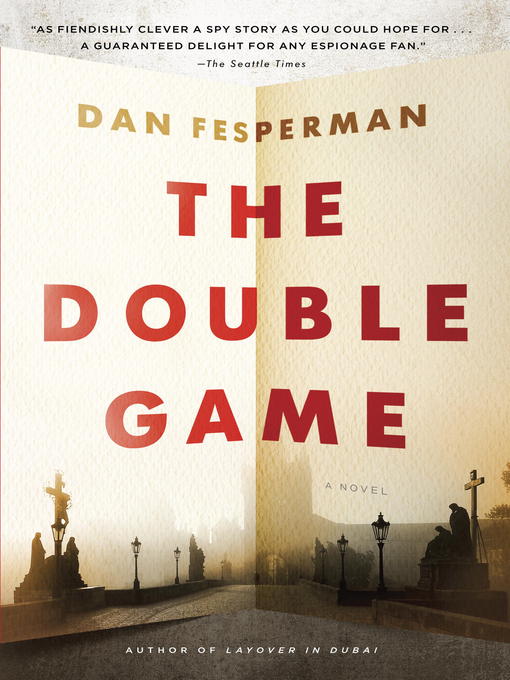
The Double Game
کتاب های مرتبط
- اطلاعات
- نقد و بررسی
- دیدگاه کاربران
نقد و بررسی

August 27, 2012
The highly accomplished Fesperman (Lie in the Dark), a veteran of the sophisticated, literary novel of intrigue, makes spy fiction a central "character" in this ambitiousâbut overly complexâstory involving journalist turned PR man Bill Cage. The action opens in 1984, when Cage interviews Edwin Lemaster, a spy who became "the world's premier espionage novelist," and elicits a vague confession: that he might have betrayed his country just "or the thrill of it." Fast forward to 2010 when Cage receives a hand-delivered letterâtyped on his own stationary and on his own typewriterâthat promises to deliver "the whole truth" about Lemaster. Cage plays along, deciphering the clue in the first note to find a "dead drop" to receive further instructions. The trail takes him to Vienna, where he had lived as a teenager with his father, a member of the diplomatic corps who might have had a toe in the world of espionage. One clue leads him to a meeting with his old flame, Litzi Strauss, and together they travel to Prague and Budapest. Cage is enveloped in a fog of intrigue, but it feels too much like an elaborate gameâno real menace, nothing really at stakeâand the reader's patience wears thin while trying to make sense of the intricately constructed and highly contrived plot. Still, perceptive readersâparticularly those familiar with the spy literatureâmight still enjoy this beautifully written book. First printing: 40,000.

December 1, 2012
In 1984, young Washington Post writer Bill Cage ignited a miniscandal by reporting that spy novelist Edwin Lemaster--"the American John le Carre"--had considered working as a Soviet double agent when he was with the CIA. More than 25 years later, Cage follows up his story for Vanity Fair--duly warned by his father, a former diplomat who knew Lemaster, to watch his back. The distinguishing feature of Fesperman's nostalgia-soaked novel is that its clues and secret instructions take the form of quoted passages from classic spy novels by le Carre, Eric Ambler, Len Deighton, Charles McCarry, etc. Like his father, Warfield, Cage is a spy buff who can quote from those books (and Lemaster's) verbatim. He secures the magazine assignment mainly as an excuse to leave his dreary PR job and return to his childhood haunts in Vienna, Prague, Berlin and Budapest. But, stoked by anonymous tips, odd coincidences and revelations about his secretive old man, he soon becomes obsessed over solving the mysteries of Lemaster's past. The romantic stakes are raised when Bill's boyhood girlfriend, Litzi, turns up in Vienna; feelings of nostalgia are disrupted when a player in this espionage drama gets shot in the face, KGB-style. Fans of spy novels will enjoy Fesperman's affectionate homage. As literate and well-executed as this book is, however, it lacks the deeper dimensions that would make it more than a clever generic exercise. The father-son business, also involving Cage's child, David, is affecting, but held against the high standards of le Carre's A Perfect Spy, it is lightweight. Has its limitations, but in re-sparking interest in classic spy fiction, it attains maximum impact.
COPYRIGHT(2012) Kirkus Reviews, ALL RIGHTS RESERVED.

March 1, 2012
Winner of a couple of daggers from the Crime Writers' Association, plus the Dashiell Hammett Award from the International Association of Crime Writers, Fesperman knows the spy genre well enough to introduce echoes of John le Carre and others into his newest thriller. No word yet on plot--this just dropped into the schedule--but settings in Berlin, Prague, Vienna, and Budapest suggest dark glamour and events rooted in the Cold War legacy of World War II.
Copyright 2012 Library Journal, LLC Used with permission.

Starred review from September 15, 2012
In the mid-1980s, journalist Bill Cage inadvertently reveals a startling secret about best-selling spy turned novelist Edwin Lemaster. Many years later, Cagenow a former journalist, his own career, like Lemaster's, never having recovered from that incidentis lured into a web of intrigue by a nameless individual who hints that, with his Lemaster revelation, Cage had only scratched the surface. What's especially clever here is the way Cage's anonymous handler (for Cage soon thinks of himself as a spy being run by an unknown operator) uses works of spy fiction to communicateencoded messages rely on Cage's virtually encyclopedic knowledge of spy fiction, and shadowy characters who wander in and out of the story bear physical resemblance to characters in spy novels (and, of course, Lemaster himself, the focal point of the intrigue, is a hugely popular spy novelist, a sort of American le Carre). At once a celebration of some of the genre's best authors and a smartly constructed and thoroughly modern spy story, this is a surefire hit and a must for anyone who reveres the espionage masters.(Reprinted with permission of Booklist, copyright 2012, American Library Association.)

























دیدگاه کاربران